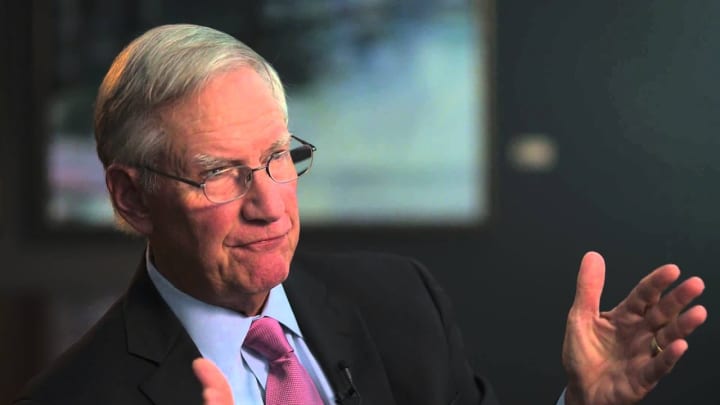The Ultimate Interview Test
Why does a CEO put interviewees through a unique, contrived experience in order to see a glimpse of their true character? A hint—it involves bacon!

When you are in my business, you always have your eye out for simple tips, advice, and yes, tricks, that work that you can pass along. As a strategic management consultant and professor, you never quite know the situation, the problem, the opportunity, or the question that you will encounter next. And so that is why when you see, hear, read, or find something that you know is a good bit of wisdom, you want to not just share it, but you want to add it to your mental Rolodex (now there's a term that dates me as being "AARP-eligible!") that you can call upon as the "right" wisdom for the "right" set of circumstances.

You never know when you might need that one idea...
And so that is why I was so excited to run across a bit of pure managerial genius! In fact, I think you may be well-advised to employ this tactic the next time you want to conduct say that second or third interview with a job candidate to see if they are "the one." And if you are job seeker going to meet your potential new boss for a meal, well, you may just want to be thinking about this when the food comes out—especially at an interview over breakfast.

Walt Bettinger, President and Chief Executive Officer of The Charles Schwab Corporation
This is Walt Bettinger, who is the President and Chief Executive Officer of The Charles Schwab Corporation. He has successfully guided Charles Schwab for now over a decade, through a little thing we call the "Great Recession" and a fast-changing, uber-competitive financial services marketplace. And it is his interview secret that we will talk about today.
Now Bettinger has a "go to" move when it comes to interviewing candidates for key positions at Schwab, and he revealed it in an interview ("Walt Bettinger of Charles Schwab: You’ve Got to Open Up to Move Up") with the New York Times in 2016. When asked by Times' reporter Adam Bryant what was the most important thing he looked for when hiring someone, Bettinger observed, "I’m most concerned with the kind of person they are, their character."

Your eggs may not be the only thing "over easy" on a breakfast interview!
So how does Bettinger get insight into the character of the person? He had a very conventional approach in that he would always ask the interviewee about both what they considered to be their greatest successes and worst failures in his or her life. His rationale for asking both questions was quite simple - to gain a perspective on how the job candidate viewed both himself/herself and those around them. In asking about their biggest successes, Bettinger said that: "What I’m looking for is whether their view of the world really revolves around others or whether it revolves around them." And when it came to asking about their biggest failures, the Schwab CEO stated that he wanted to "see whether they own them or whether they were somebody else’s fault."
Now, at least until this interview came out and anyone seeking a senior position at Schwab could easily Google "Walt Bettinger" and learn his trick, the CEO had a very good way, if a bit unconventional, way of assessing the individual's character beyond the traditional interview questions. Bettinger stated that:
"One thing I’ll do sometimes is to meet someone for breakfast for the interview. I’ll get there early, pull the manager of the restaurant aside, and say, 'I want you to mess up the order of the person who’s going to be joining me. It’ll be O.K., and I’ll give a good tip, but mess up their order.'
I do that because I want to see how the person responds. That will help me understand how they deal with adversity. Are they upset, are they frustrated or are they understanding? Life is like that, and business is like that. It’s just another way to get a look inside their heart rather than their head.
We’re all going to make mistakes. The question is how are we going to recover when we make them, and are we going to be respectful to others when they make them?"
Analysis
To me, as a management consultant and professor, Bettinger's "bad breakfast move" struck me as one of the greatest, yet simplest, tips on how to manage that I have ever run across.
Interviewing—for both sides of the equation—often seems like a waste of time, and a difficult and oftentimes darn unpleasant one at that!. Think about it! As an interviewee, how many times have you come away from an interview with the feeling that they loved you and you nailed it, only to never hear from the company again! On the other hand, sometimes we can look back on a highly productive year, two years, or a decade or more having been with a company and think to ourselves: “Gee, there’s no way on earth I would have even hired myself for this job, looking back on THAT interview!
On the management side of things, in an hour, in a day, you may have come away believing that this person was “perfect” for the job, only to be proven painfully wrong—and often in just a short time! On the other hand, how many individuals who really, really would have done good jobs once in the door never made it that far because, well maybe they had a bad day, maybe they didn’t quite answer a certain question the way you and/or the company might have wanted, or maybe subconsciously, he kinda looked too much like the guy who married the one who got away.
And so no one would argue that interviewing is a perfect science—by any stretch of the imagination. We know this from our own experience. And we also know it from decades of academic research on interviewing, which shows that people can be biased for any number of reasons—both right and wrong and both legal and illegal. More often than most managers and organizations would ever want to admit, deciding to hire or not hire someone can be based on mistaken notions, false perceptions, and literally, for no reason at all. And in retrospect—and off the record, many in management will openly wonder about their own decisions in this regard. Did they hire the "right" person? What if they passed over the "right" individual for the job.
And so yes, the "standard" job interview is perhaps the most inefficient way one could possibly devise to judge whether a person is “right” for a particular job, and conversely, for the job candidate to decide whether the job would be “right” for them.

Will you "waffle" at your breakfast interview?
That is why I think that Bettinger's concept is so wonderfully simple, and yet offers the opportunity to gain so much insight into the character of the person being interviewed. I seriously believe that for the price of the cheapest meal of the day (well, in most cases!), this is an interviewing tactic that you might seriously want to adopt and adapt for your own situation.
Why? Well, the better question is why not? We talk a great deal about finding the "right kind of person" to be a manager—of anything, whether we are talking about a small department, a store or location, or maybe even an entire operation. And yes, when you boil it all down, when we talk about emotional intelligence, we are really, really talking about character. We are talking about a concept that is almost impossible to measure, but one that is oh so important. Does the person have what it takes to be a good leader, whether they will be in a job managing two, twenty, two hundred, or two thousand people.

Could you be "toast" at your next breakfast interview?
How the job candidate reacts in that small, contrived "moment of truth" will likely provide far more evidence of how he or she will react when things go wrong on the job, and as we know, even in the best of organizations, this will go sideways—and often! As Chris Matyszczyk, writing about Bettinger's "bad breakfast" interview method for Inc. ("Why This CEO Deliberately Ruins Job Candidates' Breakfasts") recently observed, the irony - and genius - of this tip is that, "Perhaps you have to create theater in order to see someone behave naturally" (emphasis added).
So, how will the person react if the waitress serves the job candidate's plate with ham instead of bacon, toast instead of a biscuit, hash browns instead of grits, eggs over easy instead of scrambled, gluten-filled instead of gluten-free, and on and on an on? Say you even "up the ante" a bit, and you have the waiter intentionally spill a glass of water or orange juice on their interview suit (a good, safe choice over hot coffee, of course!). How will the interviewee react in that moment? You are, in essence, creating a bit of theater in order to see how the person that you are considering bringing on will handle the situation?
One can imagine that the ways in which a person responds will vary greatly. And yes, a waffle instead of pancakes is not tomato juice on your fancy trousers! However, are they calm, perhaps even too timid, or do they react way too harshly? Do they choose not say anything, preferring to accept the mistake rather than bringing it to light? Do they say something wildly inappropriate and/or even insult the service person? Do they try and console the individual with their comments?

Out of all the top management thinkers and gurus out there, my favorite over the years—really through the decades now—has been Tom Peters. The coauthor of really one of the pioneering books on strategy, In Search of Excellence: Lessons from America's Best-Run Companies, he has said much and wrote much on the importance of character in being a good manager and a good leader. He had a classic piece of advice that he used in assessing the culture of a company, and that was a simple question: “Would you want your son or daughter to work there?”
Now, with two adult sons of my own, I can really relate to the advice of my great distant management mentor. And I think the character test that Walt Bettinger employs with the breakfast interview is something that would fit perfectly in with the philosophy that overall, yes, character does matter. And in seeing how a job candidate reacts in that contrived restaurant situation might give you as a manager a whole lot of insight into how they will work with and treat others from how they react in that moment.
So, I would add a new twist on Tom’s famous adage of whether or not you would wish that your adult child work for the company in question. “Would you want your son or daughter working for this person?” If you as the interviewer like what you see in terms of the job candidate's reaction to this small thing—their breakfast order being screwed-up, then that bodes well for them in being able to deal with people with a somewhat high degree of emotional intelligence. On the other hand, if you don't like their reaction, well, the cost of that breakfast was very cheap in comparison to a hiring mistake!
Connect with the Author
Want to learn more about the work of Professor David C. Wyld? Want to work with him for your company’s benefit? Connect with him here.
About the Creator
David Wyld
Professor, Consultant, Doer. Founder/Publisher of The IDEA Publishing (http://www.theideapublishing.com/) & Modern Business Press (http://www.modernbusinesspress.com)






Comments
There are no comments for this story
Be the first to respond and start the conversation.